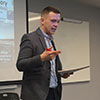Course overview
You acquire a substantial body of historical knowledge and apply, at a high level, the skills and methodologies of historical research. You demonstrate sophisticated understanding of texts and an ability to marshal an argument in pursuit of meaningful questions about the past. Most importantly, you develop as a researcher, and the teaching model empowers you to develop the kind of methodological and theoretical rigour that is essential to producing your own original research.
The curriculum enables you to focus on a particular area or field of historical research in greater depth than you may have encountered during the course of previous study or experience.
A variety of theoretical approaches, practical and critical thinking skills enable you to exercise significant judgement in a range of situations – highly valued in a range of careers.
Top reasons to study this course
> Study this course and you may be eligible for a £2,500 Sir Keith Skeoch postgraduate scholarship.
> The teaching team are highly rated research-active historians who support the work of the Centre for Culture and Creativity.
> Negotiated learning and innovative assessment strategies includes knowledge exchange projects which includes public engagement activity, such as exhibitions, websites, theatre scripts, or educational resources such as lesson plans and courses of work, ensuring that valuable employability skills are embedded within the course structure.
> Optional specialisms based on the staff research expertise bring you face-to-face with research taught by leading scholars as is attested by the history section’s Research Excellence Framework contribution, grant capture and record of current and forthcoming publications.
> High level of academic and pastoral tutor support develops your independence as a researcher, skills as a writer, and originality as a critic in a supportive and structured environment.
> An MA History provides a sound basis for either doctoral study in history and its cognate disciplines, and entry into a range of graduate-level jobs.
Course details
Course structure
Core modules
This module marks the culmination of the MA History programme, requiring you to produce an extended example of historical research. This may take the form of a dissertation of 15,000 words, or an equivalent knowledge exchange project.
You address various theoretical and practical approaches to history and focus on the acquisition of interpretive and historiographical skills and their application to some of the narratives, themes, periods and theories that engage historians at the current time.
You choose one of two specialist options relating to the specific research interests of the teaching team, giving you an opportunity to examine the subject in depth with an expert in the field. You discuss and debate your ideas within a seminar setting and design your own research questions.
This module comprises an independent study. This is initiated by you, negotiated with your supervisor to enable you to study a particular topic in greater depth.
You develop skills as a researcher with practical sessions on the framing of research questions, research methodologies, and aspects of presenting your research and applying for research funding. You undertake a primary-source analysis to deepen your archival and analytical skills and develop a knowledge exchange project to broaden your communication skills.
Modules offered may vary.
How you learn
At postgraduate level it is important that you take an active role in structuring your own learning experience, and also engage with the relevant methods and underpinning theories of the disciplines you encounter. At the same time we recognise that students embark on their study with different levels of skills and awareness of the discipline, especially in the case of mature students perhaps returning to study. The Research Skills and Methods module is designed to address these issues, involving a high degree of regular tutor contact, a firm foundation of research, interpretation and writing skills, as well as an introduction to a range of methodological approaches and historiographies.
How you are assessed
It is intended that you should experience a variety of different types of assessment, although the traditional extended essay plays a large part in the overall picture. There may also be ‘formative’ types of assessment which do not contribute to your final mark but have a useful diagnostic and developmental function. Some modules include a portfolio of exercises or short pieces, a group project, case studies or even a practical project. There are, you may be pleased to learn, no exams!
Entry requirements
You should normally have an undergraduate degree of 2.2 or above in History or a cognate discipline, or have other relevant experience or equivalent qualifications. Tutors will be happy to discuss entry requirements on a flexible basis.
For general information please see our overview of entry requirements
International applicants can find out what qualifications they need by visiting Your Country
Employability
Career opportunities
Typically graduates go on to roles in teaching, museum work, heritage management and/or administration. You may also choose to pursue further academic study - MPhil or PhD.
Information for international applicants
Qualifications
International applicants - find out what qualifications you need by selecting your country below.
Select your country:
Useful information
Visit our international pages for useful information for non-UK students and applicants.

 PhD Modern Irish History
PhD Modern Irish History MA History
MA History MA History
MA History